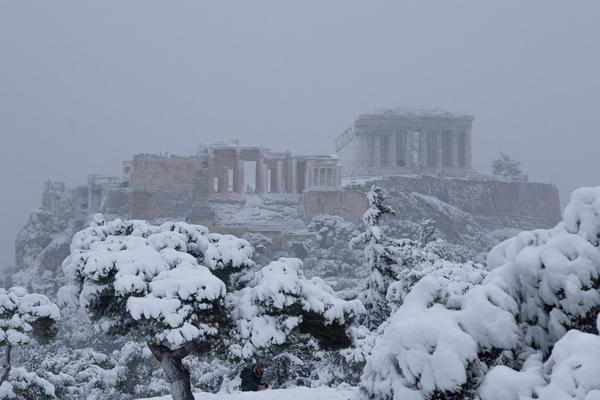In January, a rare and severe snowstorm blanketed parts of Greece and Turkey, causing chaos on the streets of major cities and forcing the evacuation of thousands of people. Storm Elpida swept across Greece and blanketed Athens with heavy snow, which rarely falls in the Greek capital but has now occurred in a second consecutive year.
Athens has only seen six snow events since 2000, and while it usually experiences average snowfall of 1.3 centimeters (0.5 inches) annually, Elpida has already brought around 8 centimeters (3.1 inches), the most since February 2021, when 10 centimeters (3.9 inches) fell. The islands of Mykonos and Santorini also experienced rare snowfalls.
Parts of Athens were hit by power cuts, and the grid operator said crews were working to restore electricity. More than 3,500 people had been evacuated, some abandoning their cars on foot; around 1,200 cars remained stuck on the Attiki Odos, the capital’s main ring-road, government spokesperson Giannis Oikonomou said. “We had a very difficult night and a superhuman evacuation effort is underway on Attiki Odos,” Oikonomou told Greek television at the time. “We are still in a very difficult phase, as the forecasts indicate that we will face [weather] difficulties again in a while,” he said.
The erratic winter weather came after a summer of high temperatures and wildfires in Greece, which scientists linked to the climate crisis. Monday’s storm also triggered a rare ‘snownado,’ which begs the question, just what is a snownado, anyway? Apparently, a “snownado” is a tornado-like funnel traveling over a snow-covered landscape, after a waterspout moved onshore, swirling snow around the base of the twister.
Meanwhile, in neighboring Istanbul, Governor Ali Yerlikaya took the rare step of temporarily banning private cars from the streets until emergency teams were able to clear them, while many public workers were granted administrative leave to keep the number of people commuting to a minimum. Footage shared by the governor showed trucks and cars stranded along highways in and around the city, and a video posted on social media showed a man skiing through city streets, with people waving as he passed.
Far away in Turkey’s south, snow fell on the beaches of the resort city of Antalya for the first time in 29 years. Istanbul Mayor Ekrem Imamoglu said 55,000 tons of salt had been used on the roads; he called on Turks to clear the snow in front of homes and shops to help emergency teams.
While scientists have not yet analyzed the link between this particular storm and climate change, global warming has pushed average temperatures in the Mediterranean up by more than 1 degree Celsius since the early 1990s, according to the EU’s Copernicus environmental monitoring program.
Sea surface temperatures in the Eastern Mediterranean and Black Sea were around 2 degrees Celsius above average in the lead-up to the snowfall, and that increase in heat would have provided additional energy to the storm as well as added moisture to the air, increasing snowfall.
—
Photo Credit: Igor Mitiakov / Shutterstock.com
Photo Credit: Igor Mitiakov / Shutterstock.com
